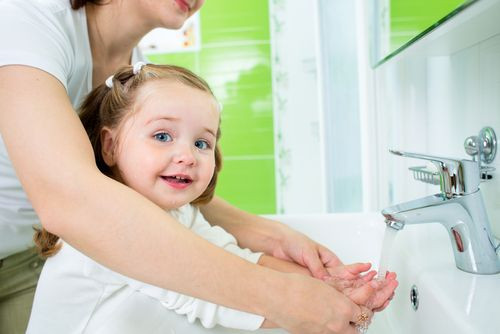Is Antibacterial Soap Harming Your Health?: Triclosan Ingredient Can Lead To Super Germs, Allergies, And Asthma

Amid the Food and Drug Adminstration’s (FDA) announcement of the mandate that will require manufacturers to provide documented proof their antibacterial products are safe and effective, many hand-washers have now begun to ponder: “Does antibacterial soap actually help combat germs?”
The “antibacterial” label is often splashed on a wide variety of bar soaps and liquids, which is suggested to be misleading for consumers who believe it will keep them healthier and protect them against viruses.
“Because of consumers' high exposure to these products, we at the FDA believe there should be clear benefits to using antibacterial soaps to balance out any risks,” Andrea Fischer, a public affairs specialist at the FDA, said during Monday’s press conference.
In May, the FDA announced on its website that it was reviewing antibacterial soaps and body washes. At the time, the website stated "the agency does not have evidence that triclosan in antibacterial soaps and body washes provides any benefit over washing with regular soap and water." Now the agency will give manufacturers approximately six months, June 2014, to respond to the planned regulation, which most likely will not be implemented for at least a year. Following, the FDA will finalize the rule and decide whether the products are "generally recognized as safe and effective" by September 2016.
Until then, the FDA recommends people to use plain soap and water to wash their hands and to avoid using antibacterial soaps, which will still be on the market for the time being. The agency also recommends an alcohol-based hand sanitizer that contains at least 60 percent alcohol if soap and water are not available.
Currently, the availability of antibacterial products may present a danger for consumers who incessantly clean their hands to protect themselves from dangerous germs that could lead to bacterial diseases. While most germs spread when an individual touches their hands to their mouth, and nose to eyes, the use of soap and warm water are said to be equally effective. The overuse of antibacterial soaps can be compared to when an individual takes antibiotics unnecessarily. These products will continue to kill some but not all bacteria, which can lead to the buildup of super germs, says The Daily Green.
Being overly hygienic can actually end up killing off good bacterial exposure and increase the chance of developing allergies and asthma, according to the hygiene hypothesis. The Mayo Clinic states several studies that have found children who were exposed to more dirt and germs experienced less allergies in adulthood compared to children who were brought up in a cleaner environment.
The overuse of antibacterial agents, such as triclosan found in antibacterial soap, can lead to endocrine disruption via triclosan exposure. Triclosan is considered to be one of the most common synthetic antibacterial agents found in products and has been linked to impact an individual’s hormonal system. The Endocrine Society, a group of doctors and scientists who specialize in the hormone system, labeled triclosan as an ingredient that alters levels of thyroid hormones and reproductive hormones like testosterone and estrogen. "I think the FDA is behind the curve," said Dr. Andrea Gore of the University of Texas at Austin, who was the lead author of the Endocrine Society's statement on hormone disrupting chemicals, the Associated Press reports. "At what point do you draw a line and say we need to take this out of products that are being applied to our skin? What is enough evidence?"
The American Cleaning Institute has provided the FDA with data that shows triclosan is both safe and effective. "Triclosan is one of the most reviewed and researched ingredients used in consumer and health care products," said Brian Sansoni, a spokesman for the group, whose members include Colgate-Palmolive and Henkel Consumer Goods Inc., maker of Dial soap.
It has yet to be known whether triclosan is safe or effective for general public use, but the FDA still encourages individuals to be aware of the possible health risks using antibacterial soaps can bring forth. The presence of triclosan can be found in the home and the human body as it is also an antimicrobial agent used in household dishwashing soaps.
When the soap reacts with chlorinated water, it can potentially produce dangerous levels of chloroform which is known to be a probable human carcinogen. This germ-killing chemical, along with other chemicals were developed decades ago before there were laws that required scientific review of these cleaning ingredients, CBS News reports. Now, four decades later, the FDA is taking a proactive measure in examining the safety level and effectiveness of this product.
The Centers for Disease Control and Prevention (CDC) recommends individuals to wash their hands for at least 20 seconds. The use of hand sanitizer, which mostly kills germs with alcohol or ethanol, not chemicals like triclosan, is also suggested if soap and water are not available.
To learn more about the possible dangers of antibacterial soap, click here.



























